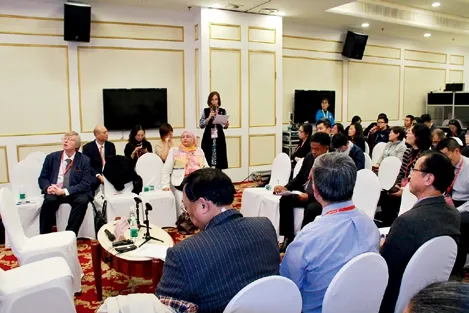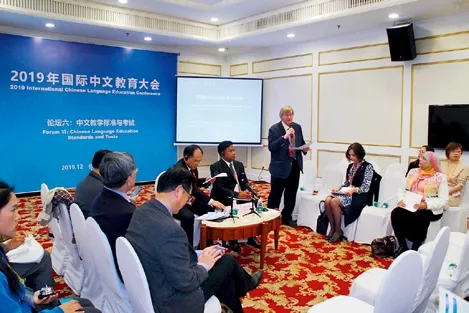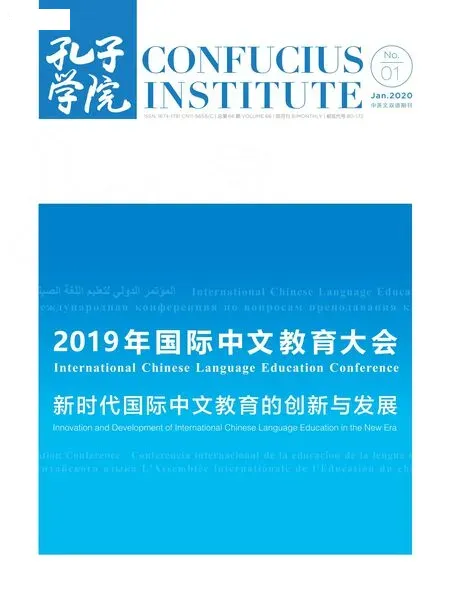中文教学标准与考试
2020-04-22
来自15 个国家的32 位嘉宾进行了精彩的发言和热烈的讨论。与会代表认为,中文教学标准是各国中文学习和教学的重要参考,建立一个与考试对接的国际中文教育标准体系迫在眉睫。作为中文母语国,中国应在国际中文教育标准制定等方面发挥更大的作用。
工作坊1.各国中文教学标准与应用
俄罗斯莫斯科国立语言大学孔子学院外方院长安德烈•谢列兹涅夫说,中文已纳入俄罗斯国家统一考试系统,但中学和大学各有各的中文教学标准,特别是在公立、私立等不同大学之间目前没有而且短期很难形成统一的标准。目前在俄罗斯影响中文教学质量的至关重要的因素是汉语教师。英国理启蒙大学现代语言中心主任、欧洲汉语教学协会副会长张新生说,一种语言的进入,必须有自己的标准、大纲,同时这种语言的相关标准和大纲必须与欧洲共同语言框架相挂钩,实现“本土化”。目前的国际汉语水平考试主要起到以考促教的作用,希望中文教学有国际性参考意义的课程大纲,包括能力标准和考试。罗马尼亚布加勒斯特大学孔子学院外方院长白罗米说,孔子学院是罗马尼亚中小学汉语教学的主力军,但是4 所孔子学院在不同的教学点也不是都有统一的教学标准,这是个问题。2016 年,汉语正式进入罗马尼亚国民教育体系,罗马尼亚教育部成立了《罗马尼亚中小学汉语教学大纲》编写组,根据欧洲共同语言框架完成了汉语教学大纲。美国肯扬大学教授、世界汉语教学学会理事白建华说,外语实施标准在美国公立K-12 贯彻得非常好,但是在美国大学基本上还是八仙过海、各显其能,没有统一标准。美国外语教师协会已制定《21 世纪外语学习标准》,从以语言要素为纲发展到以生活当中运用汉语的能力为标准,在强调语言要素、语言技能能力的同时,更突出使用语言交际的能力。复旦大学应用语言研究所所长吴勇毅说,目前世界各国对中文教学标准需求旺盛。目前国内中小学外语教学已由“教学大纲”向“课程标准”方向改革,建议研发“中文课程标准”。课程标准是一个基本的纲领性文件,要规范教学,提出质量标准,包括学生能够达到的标准等。卢旺达基加利教育学院孔子学院中方院长曾广煜说,国际中文教育需要一个标准,这个标准与一般国内的语言标准不应一样,要确保一定的统一性,保留一定的多样性,便于国际间交流。
工作坊2.中外合作开发中文教学新标准
工作坊与会专家认为,无论着眼当下,还是放眼未来,中外合作开发富有科学性和针对性的中文教学标准,对于世界各国中文教育发展都具有极为重要的意义和价值。汉语水平等级标准课题组代表梁彦民介绍了《国际汉语能力标准》修订项目的进展情况。《国际汉语能力标准》(2006年)、《国际汉语教师标准》(2007 年)、《国际汉语教学通用课程大纲》(2008 年)和2009 年新HSK 大纲共同形成了一个国际化的标准系统,对于国际中文教育事业发展起到了重要的指导和推动作用。研制统一规范、科学开放、便于应用的汉语标准体系已经势在必行。
泰国曼松德昭帕亚皇家师范大学琳达校长表示,合作开发中文教学标准,要以中国汉语教学纲领性文件为依据,吸纳欧美发达国家的成熟标准和成功经验,加强顶层设计,集思广益,融入国际化、系统性和开放性的视野,使中文教学标准更具实践性、可操作性和灵活性,注重学生的全面发展和终生发展。乌克兰南方师范大学孔子学院亚历桑德娜·波波娃院长指出,乌克兰教育发展2021 框架中一个非常重要的任务是为本土教师提供中文课程标准。
法国巴黎东方语言文化学院教授白乐桑曾带领欧洲汉语教学专家研制基于汉语特点的欧洲汉语能力标准项目,描述了A1 到B2 级别对应的汉语能力。白乐桑教授表示,这种权威性的标准研发是中国义不容辞的责任,根据欧洲语言框架详细地描述中文每个等级标准以及相关语言活动是中国汉语教学专家的责任和义务。
工作坊3.专门用途的中文教学标准与考试
与会专家认为,随着汉语教学的发展和学习者数量的增加,学习者身份呈现多样化,汉语学习的需求也更加多样、精细,出现了各类专门用途的中文教学,并且一些专门用途的汉语学习已形成一定的规模,如医学汉语、商务汉语等。具有专门用途特色的孔院也逐渐增多,如旅游孔院、商务孔院和中医孔院。如何设计专门用途的中文教学标准与考试,引导学习与教学,做好语言与职业之间的桥梁非常重要。
中文教学专门化是大势所趋。专门用途外语教学及其研究状况,是衡量一种语言作为外语教学成熟与否的重要标准。专门用途的中文教学处于承上启下的位置,是语言与职业的衔接桥梁,对学生来说非常重要。
近年来,来华学习临床医学的留学生人数增长迅猛,2018 年已达到62895 人。参加临床医学教学的一个主要瓶颈就是语言问题,医学汉语的发展十分必要。路易斯安那州泽维尔大学仅2019 年就有750 名医学生选修汉语课。医学汉语学习人数规模较大,开发医学汉语十分必要。
专门用途的中文教学与考试应针对目标需求,以交际行为为导向,以任务为基本单位。专门用途的中文教学应注重语言在实际过程中的运用,注意加强教学与实践的亲密度,在实际教学中加强学生对具体情景的体验感。考试应以典型语境下的典型任务为落脚点进行考查。
相应地,教材也应具有实用性,同时师资也强调具有相关专业背景的持汉语教师证书的教师加入,至于测评体系也强调针对性和专门化。不论是教学还是测评,语料的真实性都非常重要,有必要从“专门用途”出发,专门采集和处理不同学习群体在实际使用中真实出现过的语言材料。目前已有专家使用语言智能技术,利用人机交互、大数据等技术完成线上测评软件,为专门用途的中文考、教、学提供了强有力的技术支撑。
工作坊4.汉语水平考试(HSK)改进与推广
与会专家一致认为,汉语水平考试(HSK)目前已成为一项具有影响力的汉语能力标准化考试。汉语考试规模持续扩大,汉语考试效力增加。在日本和韩国,HSK 已成为很多学校中文专业学生毕业结业的重要评估内容,也是企业员工招聘、职位晋升的重要参考;在韩国政府主管的导游资格考试中, 特别将HSK 成绩作为评价汉语能力的标准。在中国,HSK 不仅仅是高校选拔来华留学生、授予各类奖学金的必备证明,也是留学生获得学位证和在华工作的必要条件。同时,上海移民管理部门设立汉语水平考试考点,未来HSK 成绩可能作为移民的条件之一。
2019 年汉考国际修订了《汉语考试考点管理办法》,严格考点评审,细化考点职能,加强考试组织和实施流程的监管,加大对违纪违规行为的处理。进一步扩充题库,加大随机组卷力度,确保充足的平行试卷;加大网络考试推广力度,扩大网考覆盖面,加快自适应考试开发。
考试推广手段多样化。如日本积极开展HSK 留学就业展等相关活动,促进日本学生对中国高校的了解,也为HSK 考生搭建中日企业就业桥梁。韩国境内每年增设HSK 的考场,为考生、企业、学校等提供各种便利;考教结合,将汉语考试纳入课程评估体系等。
32 guests from 15 countries delivered amazing speeches and had heated discussion. The representatives agreed that the teaching standard of Chinese language is an important reference for Chinese learning and teaching in every country and it is imperative to build an international Chinese language education standard connected with the examination. As the country with Chinese as its mother tongue, China should play a greater role in formulating international Chinese language education standards.
Workshop 1. Teaching Standard and Application of Chinese Language Education in Different Countries
Andrei Seleznev, Foreign Director of the Confucius Institute at Moscow State University in Russia said that Chinese language has been included in the unified state examination system of Russia. But middle schools and universities have their own standards for Chinese language teaching. Especially among universities,there is no certain state examination system and cannot form a unified standard in a short time. At present, the crucial factor affecting the quality of Chinese language teaching in Russia is Chinese teachers. Zhang Xinsheng, Director of the Centre for Modern Languages in Richmond, the American International University in London and Vice President of European Association of Chinese Teaching, said that the promotion of a language must have its own standard and principle. At the same time, this standard and principle must be connected to the framework of the Common European Framework of Reference for Languages.It is called achieving “localization”. Currently, the international Chinese proficiency test mainly plays the role of promoting the teaching through the test. We hope that Chinese language teaching would have a course syllabus of international reference significance including competency standards and examinations.Luminita Balan, Foreign Director of the Confucius Institute at the University of Bucharest in Romania, said that the Confucius Institute is the main force of Chinese language teaching in Romanian primary and middle schools. It was a problem that these 4 Confucius Institutes do not have a unified teaching standard in different teaching sites. In 2016, Chinese officially entered the Romanian national education system. The Romanian Ministry of Education set up a compiling committee of Chinese Language Syllabus in Primary and Secondary Schools, and completed the syllabus according to the Common European Framework of Reference for Languages. Bai Jianhua, Professor of Kenyon College,USA and Director of International Society for Chinese Language Teaching, said that the implementation of foreign language standards is working very well in public K-12, but in the United States, they do not have a unified standard. The American Association of Foreign language Teachers has formulated the Standards for Foreign Language Learning in the 21st Century.The standard changed its focus from language to developing the ability of using the language in the daily life. While underlying the language and skills, it focuses more on communication now.Wu Yongyi, Director of Fudan University’s Institute of Applied Languages, said that there is a strong demand for Chinese language teaching standards in various countries around the world.At present, foreign language teaching in domestic primary and secondary schools has been reformed from the “syllabus” to the“curriculum standards”, and it is recommended that the “Chinese curriculum standards” be developed. Curriculum standards are a basic programmatic document that standardizes teaching and proposes quality standards, including standards that students can achieve. Zeng Guangyu, Chinese Director of the Confucius Institute at the Kigali Institute of Education in Rwanda, said that China’s current international Chinese education needs a standard,which should not be the same as the domestic language standard.It must ensure a certain unity, retain a certain amount of diversity,and facilitate international exchanges.
Workshop2. New Teaching Standards Developed by Chinese Language Cooperation Between Chinese and Foreign Institutions
The experts believed that, no matter looking at the present or the future, the cooperation in developing scientific and targeted standards between Chinese and foreign institutions is of great significance and value to the development of Chinese language education around the world. Liang Yanmin, the representative of the Chinese language proficiency standards group, introduced the revision of International Chinese Language Proficiency Standards. International Chinese Proficiency Standards (2006), International Chinese Teacher Standards(2007), General Curriculum for International Chinese Language Teaching (2008) and the HSK syllabus in 2009 have formed an international standard system. They have played an important role in guiding and promoting the development of international Chinese language education. It is imperative to develop a unified, standardized, scientific and open Chinese standard system.
Linda Gainma, President of Bansomdejchaopraya Rajabhat University, Thailand, said that the cooperation for developing the Chinese language teaching standards should be based on the Chinese language teaching framework documents, and absorb the successful standards and experiences of developed countries in Europe and America, strengthen the top-level design, brainstorm ideas and integration into the international, systemic and open view. We shall make the standards of teaching Chinese language more practical, operable and flexible and focus on the comprehensive development and life-long development of students. Alessandro Popova,Director of the Confucius Institute at South Ukrainian National Pedagogical University, pointed that a very important task in the framework of Ukrainian education development in 2021 is to provide Chinese language course standards for local teachers.
Joel Bellassen, Professor of National Institute for Oriental Languages and Civilizations has led European Chinese language teaching experts to study the Chinese ability standards based on Chinese language characteristics, describing the Chinese ability corresponding to levels A1 to B2. He said that the development and research of this authoritative standard is China’s incumbent responsibility. It is the responsibility and obligation of Chinese language teaching experts to describe each level of Chinese standards and related language activities in detail according to the Common European Framework of Reference for Languages.
Workshop 3. Special-Purpose Chinese Language Teaching Standards and Examination
The experts believed, with the development of Chinese teaching and the increasing number of the Chinese learners,the identity of learners has become diversified and the needs of Chinese language learning have become more diverse and sophisticated. A lot of specialized Chinese language teaching system such as medical Chinese and business Chinese are emerged and have a certain scale. The number of the Confucius Institute with special purpose has gradually increased,such as the Tourism Confucius Institute, the Business Confucius Institute and the Traditional Chinese Medicine Confucius Institute. How to design special-purpose Chinese language teaching standards and tests, how to guide learning and teaching, and how to make a good bridge between language and career is very important.
The specialization of Chinese language teaching is a general trend. Special-purpose foreign language teaching and its research are important criteria for measuring the maturity of a language’s education in other countries. Special-purpose Chinese language teaching serves as a connecting link and a bridge between language and career. It is very important for students.
In recent years, the number of international students studying clinical medicine in China has grown rapidly, reaching 62, 895 in 2018. The language problem is one of the major bottlenecks in participating in clinical medical teaching, and the development of medical Chinese language is very necessary. 750 students selected Chinese language courses in Xavier University of Louisiana in 2019. There are so many medical Chinese learners, and it is necessary to develop medical Chinese. Special-purpose Chinese language teaching and examinations should be aimed at the needs, oriented by communicative behavior, and based on tasks. It should pay attention to the use of language in the actual process, pay attention to strengthening the connections between teaching and practice,and strengthen the students’ experience of specific situations in real teaching. The examination should be based on a typical task in a typical context.
Correspondingly, the teaching materials should be also practical. At the same time, teachers having Chinese teacher certificates and relevant professional backgrounds should be recruited.As for the evaluation system, it should focus on purpose and specialization. No matter the teaching or evaluation, the authenticity of the corpus is very important. It is necessary to start from the“special purpose” and specifically collect and process the language materials that have actually appeared in different learning groups in daily life. At present, experts have used language intelligence technology to complete online assessment software using technologies such as human-computer interaction and big data,providing strong technical support for special-purpose Chinese examinations, teaching, and learning.
Workshop 4. Improvement and Promotion of Chinese Proficiency Test (HSK)
The experts agreed that the HSK has now become an influential standardized test of Chinese language proficiency.The scale of Chinese examinations has continued to expand,and the influence of Chinese examinations has increased.In Japan and the ROK, HSK has become an important assessment content for graduation and completion of Chinese language majors in many schools, and it is also an important reference for the recruitment and promotion of employees.In the qualification test for guides administered by the ROK government, HSK scores are especially used to evaluate Chinese proficiency. In China, HSK is not only a necessary proof for universities to select foreign students in China and grant various scholarships, but also a necessary condition for international students to obtain a degree certificate and working in China. At the same time, the Shanghai Immigration Management Department has set up a Chinese proficiency test site, and future HSK results may be one of the conditions for immigration.
In 2019, the Chinese Testing International Co., Ltd. has revised the Administrative Measures for Chinese Test Centers to conduct strict test and review, refine the functions, strengthen the supervision of test organization and implementation,and increase punishment for violations of discipline and rules.The Chinese Testing International Co., Ltd. has further expanded the question bank, increased the random test papers to ensure sufficient parallel tests; it has also increased the promotion of online exams, expanded the coverage of online exams,and speeded up the development of adaptive tests.
The methods of examination promotion are diversified.For example, Japan is actively carrying out related activities such as the HSK Study Abroad Employment Promotion to promote Japanese students’ understanding of Chinese colleges and universities and also build employment bridges for Chinese and Japanese companies for HSK candidates. HSK test rooms are added every year in the ROK to provide various conveniences for candidates, companies, and schools. We shall combine examination with teaching, and include Chinese examination into the curriculum evaluation system.



